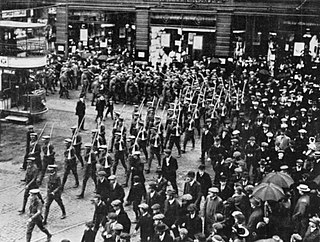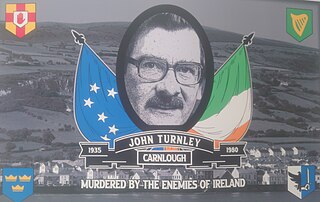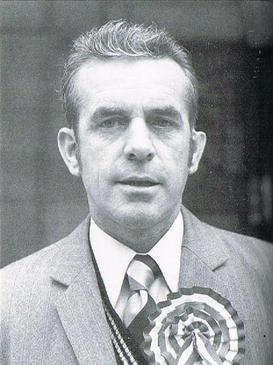Related Research Articles

The Ulster Unionist Party (UUP) is a unionist political party in Northern Ireland. The party was founded as the Ulster Unionist Council in 1905, emerging from the Irish Unionist Alliance in Ulster. Under Edward Carson, it led unionist opposition to the Irish Home Rule movement. Following the partition of Ireland, it was the governing party of Northern Ireland between 1921 and 1972. It was supported by most unionist voters throughout the conflict known as the Troubles, during which time it was often referred to as the Official Unionist Party (OUP).

Edward Henry Carson, Baron Carson, PC, PC (Ire), from 1900 to 1921 known as Sir Edward Carson, was an Irish unionist politician, barrister and judge, who served as the Attorney General and Solicitor General for England, Wales and Ireland as well as the First Lord of the Admiralty for the British Royal Navy. From 1905 Carson was both the Irish Unionist Alliance MP for the Dublin University constituency and leader of the Ulster Unionist Council in Belfast. In 1915, he entered the war cabinet of H. H. Asquith as Attorney-General. Carson was defeated in his ambition to maintain Ireland as a whole in union with Great Britain. His leadership, however, was celebrated by some for securing a continued place in the United Kingdom for the six north-eastern counties, albeit under a devolved Parliament of Northern Ireland that neither he nor his fellow unionists had sought. He is also remembered for his open ended cross examination of Oscar Wilde in a legal action that led to plaintiff Wilde being prosecuted, gaoled and ruined. Carson unsuccessfully attempted to intercede for Wilde after the case.
The Progressive Unionist Party (PUP) is a minor unionist political party in Northern Ireland. It was formed from the Independent Unionist Group operating in the Shankill area of Belfast, becoming the PUP in 1979. Linked to the Ulster Volunteer Force (UVF) and Red Hand Commando (RHC), for a time it described itself as "the only left of centre unionist party" in Northern Ireland, with its main support base in the loyalist working class communities of Belfast.
The Sunningdale Agreement was an attempt to establish a power-sharing Northern Ireland Executive and a cross-border Council of Ireland. The agreement was signed at Northcote House in Sunningdale Park, located in Sunningdale, Berkshire, on 9 December 1973. Unionist opposition, violence and a general strike caused the collapse of the agreement in May 1974.

The Senate of Northern Ireland was the upper house of the Parliament of Northern Ireland created by the Government of Ireland Act 1920. It was abolished with the passing of the Northern Ireland Constitution Act 1973.
The Volunteer Political Party (VPP) was a loyalist political party launched in Northern Ireland on 22 June 1974 by members of the then recently legalised Ulster Volunteer Force (UVF). The Chairman was Ken Gibson from East Belfast, an ex-internee and UVF chief of staff at the time. The success of the Ulster Workers Council Strike had shown some UVF leaders the political power they held and they sought to develop this potential further. The UVF had been banned by the Government of Northern Ireland in 1966, but was legalised at the same time as Sinn Féin by Labour Secretary of State Merlyn Rees in April 1974 in order to encourage a political path for Loyalist and republican paramilitary groups.
John Beattie was a Northern Ireland Labour Party (NILP) politician from Northern Ireland. He was a teacher by profession. In 1925, he became a Member of the Northern Ireland House of Commons for Belfast East. He represented Belfast Pottinger from 1929. At one point he served as leader of the NILP.

The Ulster Volunteers was an Irish unionist, loyalist paramilitary organisation founded in 1912 to block domestic self-government for Ireland, which was then part of the United Kingdom. The Ulster Volunteers were based in the northern province of Ulster. Many Ulster Protestants and Irish unionists feared being governed by a nationalist Catholic-majority parliament in Dublin and losing their links with Great Britain. In 1913, the militias were organised into the Ulster Volunteer Force (UVF) and vowed to resist any attempts by the British Government to impose Home Rule on Ulster. Later that year, Irish nationalists formed a rival militia, the Irish Volunteers, to safeguard Home Rule. In April 1914, the UVF smuggled 25,000 rifles into Ulster from Imperial Germany. The Home Rule Crisis was interrupted by the First World War. Much of the UVF enlisted with the British Army's 36th (Ulster) Division and went to fight on the Western Front.
Thomas Gibson Henderson was an Independent unionist politician. He served in the House of Commons of Northern Ireland from 1925 to 1953 in vigorous opposition to the Unionist governments on all issues other than the partition of Ireland, and is famous for having at one stage spoken for nearly ten hours to outline his disagreements.
Independent Unionist has been a label sometimes used by candidates in elections in the United Kingdom, indicating a support for British unionism.
Sam Kyle was an Irish trade unionist and politician.

William McMullen was an Irish trade unionist and politician. A member of the Labour movement, McMullen primary work was a trade unionist, but he was also a successful politician who secured office in the Parliament of Northern Ireland. Despite coming from a Presbyterian family, McMullen was also an avowed Irish republican, bitterly opposing the partition of Ireland in the 1920s and joining the Republican Congress in the 1930s. In the 1940s McMullen became the leader of the Irish Transport and General Workers' Union and in the 1950s, he became a member of the Irish senate.

John Turnley was an Irish politician and activist. Originally from a unionist background, he was gradually drawn to Irish nationalism and became a republican activist. He was assassinated in 1980 by loyalists in Carnlough, County Antrim.
Sir Joseph Davison was a prominent Northern Irish Unionist politician.
Thomas Sinclair, was an Irish unionist politician.
Sir George Anthony Clark, 3rd Baronet, DL was an Orangeman and unionist politician in Northern Ireland.
Robert Gordon Sharman-Crawford PC was a unionist politician in Northern Ireland.
Robert Dorman was an Irish socialist activist.

Kenneth Gibson was a Northern Irish politician who was the Chairman of the Volunteer Political Party (VPP), which he had helped to form in 1974. He also served as a spokesman and Chief of Staff of the loyalist paramilitary organisation, the Ulster Volunteer Force (UVF).
John Wesley Neville Martin was a Northern Irish politician who served as a member of the Parliament of Northern Ireland for the Ulster Unionist Party.
References
- ↑ John F. Harbinson, The Ulster Unionist Party, 1882-1973, p.206
- ↑ Ballymacarrett Poor Law Election, Hansard , 8 April 1895
- ↑ Timothy Bowman, Carson's Army: the Ulster Volunteer Force, 1910-22, p.98
- ↑ Constantine FitzGibbon, Red Hand: The Ulster Colony, p.256
- ↑ "New Ulster Senator", Daily Mirror , 1 May 1935, p.7
- ↑ The Northern Ireland Senate, 1921-72, Northern Ireland Elections